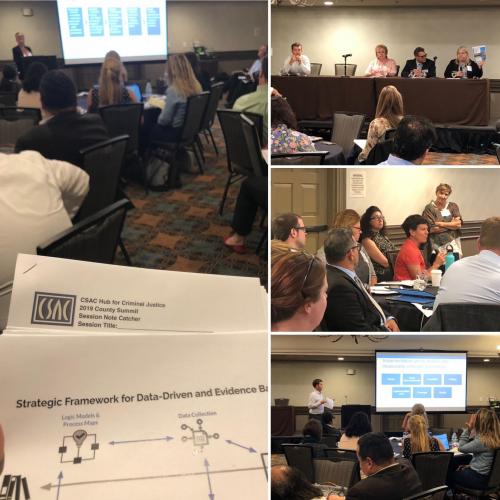Highlights From the 2019 CSAC Support Hub Summit
 Counties play an important role on the front lines of
California’s criminal justice system. For the last five years, a
handful of counties have accessed support for their criminal
justice programs through participation in our Results First
Initiative. This initiative has been critical in laying the
foundation for the work of CSAC’s
Support Hub for Criminal Justice Programming (The Hub) to
empower counties to continue prioritizing data-driven and
evidence-based policymaking.
Counties play an important role on the front lines of
California’s criminal justice system. For the last five years, a
handful of counties have accessed support for their criminal
justice programs through participation in our Results First
Initiative. This initiative has been critical in laying the
foundation for the work of CSAC’s
Support Hub for Criminal Justice Programming (The Hub) to
empower counties to continue prioritizing data-driven and
evidence-based policymaking.
Last week, 85 leaders from 20 counties across California gathered in Ventura County for a day and a half of learning and planning to build more champions for the evidence based movement in criminal justice. The CSAC Support Hub Summit included panels and workshops focus on providing counties with an overview of the building blocks for effective program design and implementation, as well as how to harness the power of data analysis to inform their practices. Panels and workshops featuring experts and county practitioners shared expertise in using logic models and process maps, enhancing contracting practices and utilizing data analysis to answer key criminal justice questions.
DAY ONE: Building Blocks for Program Design and Implementation
The summit opened with a panel of staff from Kern, Santa Clara, and Solano Counties who have direct experience inventorying their adult criminal justice programs. “You can’t know where to go until you know where you are at,” said Jennifer McDermott, Solano County Probation, of the importance of inventorying for improving criminal justice program efficiency and efficacy.
Panelists shared lessons learned and plans to continue using their program inventories as a planning and capacity building tool. “What is most valuable is the dialogue and conversations we were able to have with our partners,” added Buu Thai, from the Santa Clara County Administrator’s Office.
Lunch featured Ashleigh Holand, Senior Manager, State Policy for The Pew-MacArthur Results First Initiative. She shared an overview of the 2018 report, “How Counties Can Use Evidence-Based Policymaking to Achieve Better Outcomes” published in coordination with the National Association of Counties. Her overview included how different types of evaluations support local decision-making, and how the “next steps” for the Pew Results First Initiative mirror the ongoing work of the CSAC Support Hub.
Participants then took a deep dive into the interplay between design, implementation, and collection of data. County representatives learned how they could utilize two tools: logic models and process maps to guide program design, align collection strategies to literature, and look at their criminal justice programs from the perspective of clients and practitioners in order to deepen understanding of how systems work and better make implementation improvements to meet desired outcomes.
Day one ended with a panel on the challenging endeavor of implementing contracting changes or reforms for criminal justice programs. A panel that included representatives from the California Department of Corrections and Rehabilitation, Los Angeles County, GEO Corporation, Social Finance, and UC Berkeley highlighted state, county, and provider perspectives on contracting.
DAY TWO: Harnessing the Power of Data Analysis to Inform Practice
Effective champions of evidence-based practice are collaborative, data-driven, and have a deep understanding of their criminal justice population, program costs, and outcomes, as “data is more important than ever,” said Alameda County Probation Chief Wendy Still.
Participants learned about the analytic questions facing criminal justice agencies, tools that can help address these questions, strategies to inform practice, and ways data analysis can be woven throughout your work. Finally, a panel of probation chiefs from three counties– Chief Still; Chief Francisco Giraldo, Santa Cruz County, and Chief Tanja Heitman, Santa Barbara County– shared reflections and experiences in how they use data in their leadership.
The Summit concluded with county teams gathering to roll up their sleeves and review what they learned. Small groups brainstormed capacity needs, and engaged in strategic planning related to program design, implementation and data analysis.
The CSAC Support Hub will continue to engage these counties by providing resources and technical assistance for a host of activities. In the coming months and weeks, the CSAC Support Hub looks forward to working with more county criminal justice partners. If you’re looking for assistance in any of the following areas, be sure to reach out for help.
- Creating inventories of programs
- Constructing program logic models to guide implementation and data collection,
- Conducting benefit-cost analysis to help guide resource allocations,
- Improving contracting language, or
- Creating data dashboards for populations, programs, and recidivism outcomes
For more information about the CSAC Support Hub for Criminal Justice Programming contact: RSouza@counties.org.












































